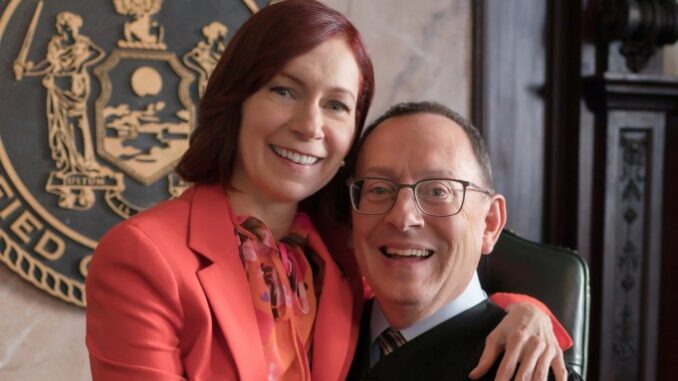
The Chessboard and the Serpent: A Tease of Danger in Elsbeth’s Corridors
The polished marble floors of the courthouse, usually echoing with the measured tread of justice, seemed to hold a different kind of resonance that day – a hum of static electricity preceding a storm. In the whimsical, yet razor-sharp world of Elsbeth, where the eccentric legal genius Elsbeth Tascioni navigates New York’s convoluted crimes, the air crackles with a promise of impending drama, specifically after a recent, seemingly innocuous confrontation. The tease, delivered by the masterful duo of Carrie Preston and Michael Emerson, isn't a mere plot point; it's a symphony of subtle menace and exhilarating anticipation, hinting at a deep, intellectual danger that lurks just beyond the frame.
Carrie Preston’s Elsbeth Tascioni is a character designed to disarm and delight. She is a walking, talking paradox – a brilliant mind cloaked in a perpetual state of wide-eyed wonder, her observations often delivered with the innocent bluntness of a child, yet cutting to the heart of a case with surgical precision. Her methods are unconventional, her deductions born from an almost hallucinatory absorption of minutiae, her very presence a charming disruption to the staid halls of justice. To witness Elsbeth at work is to watch a human kaleidoscope, constantly shifting patterns until a hidden truth unfurls. Preston inhabits her with a delightful physical theatre: the tilted head, the expressive hands, the subtle tightening of her expressive eyes as a thought clicks into place.
Into this vibrant, off-kilter world steps Michael Emerson. A maestro of the understated threat, Emerson rarely needs a villain’s mustache twirl. His menace is woven into the very fabric of his stillness, his precise enunciation, the way his eyes can hold both intelligence and an almost reptilian coldness. Whether as the enigmatic Ben Linus in Lost, the watchful Harold Finch in Person of Interest, or the subtly manipulative Julian Fellowes in The Good Wife (where he first sparred with Preston’s Elsbeth), Emerson possesses a unique ability to suggest unfathomable depths beneath a placid exterior. He is the quiet predator in the carefully constructed garden, and his character’s entry into Elsbeth's orbit shifts the show’s vibrant palette towards stygian hues.
The "courthouse confrontation" itself was likely no theatrical shouting match. Instead, one imagines a ballet of wits, a subtle tightening of the jaw, a glance held a moment too long. It would have been a recognition, an almost imperceptible nod from one formidable intellect to another, signifying not admiration, but a challenge laid down. Elsbeth, with her uncanny ability to see patterns others miss, would have inadvertently, or perhaps purposefully, poked at a hidden nerve in Emerson’s character. And in response, Emerson’s character would have offered a sliver of his true self – a calculated flash of an agenda, a hint of power, a promise of consequences. It’s the kind of confrontation where the silence hums louder than any dialogue, where a seemingly polite exchange is merely the tip of a very dangerous iceberg.
The danger teased ahead isn’t merely physical. While a more direct threat is always possible, the true menace promised by this pairing is a battle of intellects, a psychological chess match where Elsbeth’s intuitive brilliance faces off against Emerson’s cold, strategic cunning. His character will likely represent a darker, more entrenched power – perhaps a corrupt element within the system, or a rival mind determined to exploit Elsbeth’s unique vulnerabilities. The threat is to Elsbeth’s methods, her very perception of justice, and perhaps even her buoyant optimism. It’s the serpent in the garden of her whimsical investigative process, threatening to poison her well of innocent observation.
What makes this tease so potent is the meta-narrative layer of Preston and Emerson's shared history. Audiences have seen them spar before, notably in The Good Wife, where Emerson’s Julian Fellowes presented a sophisticated counterpoint to Elsbeth’s chaos. Their on-screen chemistry is less about romantic tension and more about the exhilarating clash of two highly distinct, yet equally sharp, acting styles. They are two grandmasters of the craft, each bringing a unique set of tools to the chessboard. Knowing their previous dynamic, the audience implicitly trusts that any "danger ahead" will be handled with intelligence, depth, and a delicious unfolding of character.
Thus, the tease transcends mere plot; it becomes a promise. It’s an invitation to watch two exceptional performers navigate a landscape fraught with intellectual peril. The courthouse confrontation wasn't an end, but a startling beginning. It was the moment the game truly began, the curtain rising on a dance between light and shadow, between the quirky genius and the quiet menace. And for the audience, the anticipation of Elsbeth's next steps, and Emerson's next move, is an electric hum that makes the wait for what comes next utterly thrilling.
